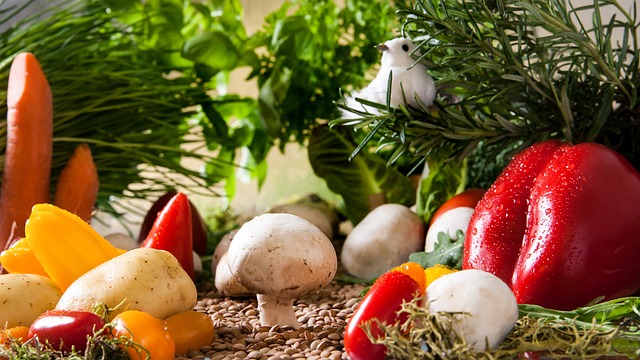
6 Must-know Tips to Keep Your Vegetable Garden Healthy
Owning a vegetable garden can be a rather rewarding experience especially when things are going right. However, one thing that can discourage any farmer is a situation whereby the garden plants get infected with diseases. When this happens, a lot of questions arise such as; how did happen? Will, it spread to the other plants? How exactly can one get them off?
It is, however, vital to note that as far as the prevention of diseases in this regard is concerned, the disease triangle is an important thing to note. It is worthy of note that diseases can only occur on the condition that three things happen at the same time. First and foremost, there has to be a host plant as well as a disease-causing organism and finally environmental factors.
What this simply implies is that if one of the aforementioned factors is not present, the disease won’t occur. It, therefore, suffices to say that for you to prevent diseases; at least one of the factors must be absent. Therefore, instead of hanging around for the disease to occur in your garden, you may want to consider prevention as the best attack. Here are a few tips to help you avert a disease invasion of your garden.
Table of Content
Carefully study plants before purchasing them
One of the most potent yet easiest ways to avert a disease invasion of your garden is to avoid a situation where they will have access in the first place. One of the most complex yet necessary things to learn in gardening is what and how a healthy plant ought to look like. In light of this, it is essential to study relevant books and relevant catalogs. Ignorance of how healthy plants should look like leads to a spread of the disease to hitherto healthy plants.
Aside from taking the time to look at the plant from the top, you may also want to check the root of the plant. Roots ought to be firm, and well-spaced around the root ball. If you detect that the roots are dark, it is not a good sign at all. If however, you think the top is healthy, it won’t take much time before the effect of the rotted root kicks in. making use of Miracle-Gro PottingSoil may also be a good idea in this regard
Bugs should be kept at bay
What many are aware of is the fact that the damages caused by insects to plants are a lot more than cosmetic in nature. More often than not, bacteria and viruses can only find their way into a plant via seepage. Also, some insects function as vectors for viruses transferring them from plant A to plant B. one common carrier is known as Aphids as well as thrips. Leafhoppers also convey Aster Yellows. It is also worthy of note that attacks from insects are one sure way to get garden plants under undue stress thus making it too weak to fight diseases.
Right fertilizer should be applied
Fertilizers are indeed an important aspect of gardening and can be a vital catalyst in ensuring that you get the right volume and quality of yield. However, if you do not apply it in the right quantity, you run the risk of getting the roots burnt thus limiting its ability to get water absorbed. This on its own predisposes the plant to unusual stress arising from cold, drought and heat. The differences between plants that are deprived of nutrient are usually smaller in terms of size and are usually have leaf spots. Also, another factor that can put pressure on the plant is the excessive presence of a certain type of nutrient.
You may, therefore, want to get a soil test carried out by an extension worker who should guide you on the right nutrient level your soil needs.
Get it pruned
As far as trimming shrubs and trees is concerned, it is much more ideal to get it done during later part of winter as against the spring season. The reason for this is simply that wounded limbs are at great risk of being infected during the course of winter. This, therefore, gives room for establishment while the plant is dormant. It should, however, be noted that late winter pruning goes a long way in ensuring that diseases are prevented from spreading to new points. Of course, there is always the possibility that the same damage could reoccur during the course of the winter, it is better to do the needful in time.
H2O
Water is life and regularly watering your garden is very much ideal. However, you should know that as much as plants need water to survive, diseases also do. It is therefore imperative to note that the way you go about it is what counts at the end of the day. A number of diseases causing organisms require water to carry out functions such as growth, reproduction, and movement. Therefore, if you seek to starve them of the environment they crave for; deploy watering methods which will limit the water in the foliage of the plant. For this purpose, drip irrigation and soaker hoses are ideal. If you are however watering using your hands, make sure that you remove the leaves from the way as the watering goes on.
A high number of the leaf related problems occur when the leaves appear wet meaning that you should avoid overhead sprinkling as much as possible. If you, however, want to take this route, ensure that you do so at a time when the leaves will dry out quickly while the roots retain as much water as possible.
Give your plants the right spacing
When you are spacing transplants, be as careful as much as possible; also monitor the established plants even as they spread. More often than not, when plants are crowded, they tend to create their own humidity which permits the entry of certain diseases such as rust, and downy mildew. By increasing the spacing, you permit the free flow of air thus keeping the foliage dry and diseases at bay. You should note that plants that are poorly spaced usually suffer stunted growth due to the competition for water, light, and nutrients.
In conclusion, the health and vitality of your garden is a core function of the deliberate inputs made in that direction. The aforementioned points if well applied will doubtless put your garden on the path to continuous productivity.


